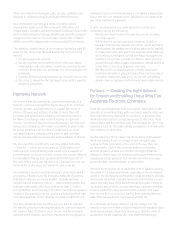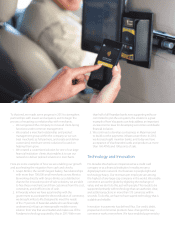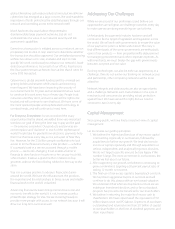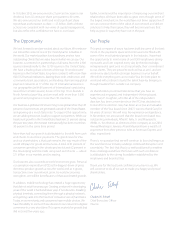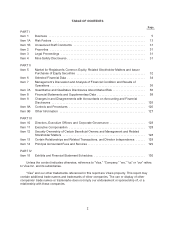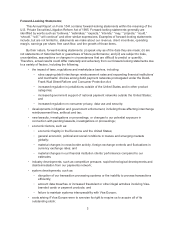Visa 2013 Annual Report Download - page 14
Download and view the complete annual report
Please find page 14 of the 2013 Visa annual report below. You can navigate through the pages in the report by either clicking on the pages listed below, or by using the keyword search tool below to find specific information within the annual report.In emerging markets, Visa is helping to expand electronic payment services to the unbanked
and underserved. Visa introduced the world’s first bank-grade managed service, making it
easy and cost-efficient for financial institutions and mobile operators to offer mobile financial
services to their consumers. Visa’s new managed service solution already enables mobile
money programs in India and Rwanda.
•Client contracts. In 2013, we partnered with one of our largest financial institution clients to
customize a processing solution using VisaNet that is designed to accelerate the growth of
electronic payments, deliver added value to merchants and provide a better experience for
account holders.
•Regulation. Rules were implemented in the United States during 2011 and 2012 with respect
to debit products under the Dodd-Frank Wall Street Reform and Consumer Protection Act
(the “Dodd-Frank Act”), which regulates, among other things, debit interchange
reimbursements rates, the availability of debit networks, financial institutions’ and merchants’
choices among these networks, and transaction routing. As a result, we have significantly
modified our debit strategy and continue to renegotiate some portions of our contracts with
our financial institution clients. In July 2013, a federal court invalidated these rules and
ordered the U.S. Federal Reserve to revise them. However, that order has been stayed, and
the rules have been left in place, pending the resolution of an expedited appeal filed by the
Federal Reserve to the federal appeals court. See Government Regulation below.
•Interchange multidistrict litigation settlement. In 2012, we reached a settlement in the
interchange multidistrict litigation, subject to final court approval and the adjudication of any
appeals. We believe that this settlement ensures the long-term health and competitiveness
of the payments industry in the United States. Certain merchants in the proposed settlement
classes, however, have objected to the settlement and a number of merchants have filed
opt-out claims. See Item 1A—Risk Factors—Our retrospective responsibility plan may not
adequately insulate us from the impact of settlements or final judgments and Item 8—
Financial Statements and Supplementary Data—Note 20—Legal Matters included elsewhere
in this report.
Nature of Operations
Visa’s mission is to accelerate the electronification of commerce. We operate an open-loop
payments network in which Visa connects and manages the exchange of information and value
between: (i) issuers — financial institutions that issue Visa-branded cards or payment products to
account holders, and (ii) acquirers — financial institutions that contract with merchants to accept Visa-
branded cards or payment products. We do not earn revenues from, or bear credit risk with respect to,
interest or fees paid by account holders on Visa-branded cards or payment products. The issuers have
the responsibility for issuing cards and other payment products, and determining the interest rates and
fees paid by the account holders.
Interchange reimbursement fees represent a transfer of value between the financial institutions
participating in our open-loop payments network. On purchase transactions, interchange reimbursement
fees are paid by the acquirers to the issuers. We generally do not receive any revenue related to
interchange reimbursement fees. In addition, we generally do not earn any revenue from the fees that
merchants are charged for acceptance by the acquirers, including the merchant discount rate. The
acquirers are typically responsible for soliciting merchants, and establishing and earning these fees.
6


